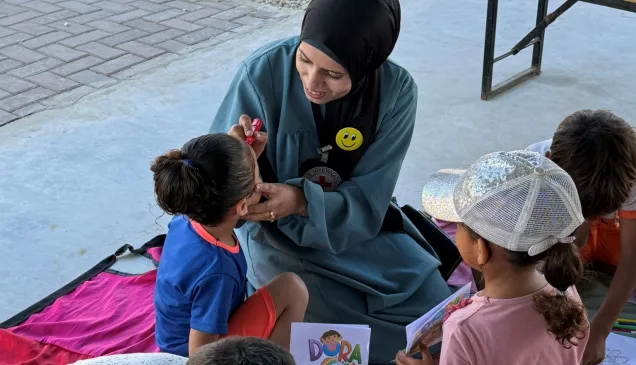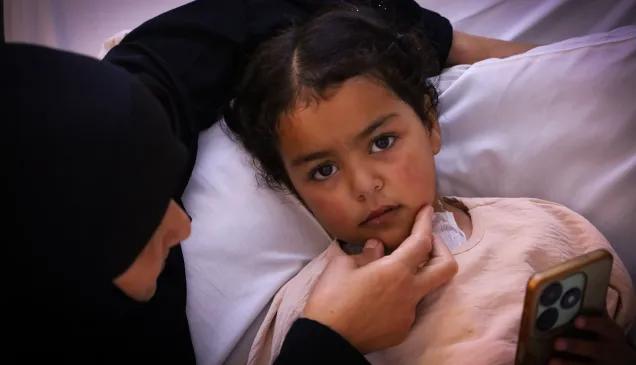Health care workers save lives: Condemnation of attacks linked to COVID-19

The safety and protection of health care workers and health care infrastructure is paramount during the COVID-19 pandemic. To drive home this message, a community of concerned advocates, representing 13 medical and humanitarian global organizations appearing for more than 30 million health care professionals, have issued a declaration condemning increasing incidents of attacks against health workers and facilities.
The community, spanning advocates from more than 120 countries, points to the over 200 incidents of COVID-19 related attacks – a trend that endangers these vital front line responders and the communities they serve.
Ensuring that health care workers are safe and able to carry out their jobs is crucial for their protection. Their protection is essential in ensuring the continuing care of the lives of people affected by the disease. Health care workers are, per definition, exposed to the virus in their life-saving activity and they should not be stigmatized for this.
Declaration by Health Care in Danger community on violence against health care workers
First, we would like to express our heartfelt support for all the health workers responding to the COVID-19 pandemic, and for those working tirelessly in so many other areas of health care as well. Health-care workers and facilities and medical vehicles should never be a target of violence, and we urge governments, communities and weapon bearers to respect and protect health care at all times, and to contribute to creating a protective environment in which health care can be provided safely.
Unfortunately, the sad reality is that health workers have for a long time been subject to many shocking forms of violence. The recent displays of public support for COVID-19 responders are heartwarming, but many responders are nevertheless experiencing harassment, stigmatization and physical violence. Some health-care professionals and the people they were caring for have even been killed. At least 208 reports of such incidents have emerged since the beginning of the pandemic, and each day brings new stories of intimidation and harm.
Violence against health care must not be tolerated. We stand firmly against it, and are working as a global community to build a world where health workers and patients are safe and respected. We call on everyone reading this message to join with us and protect health care from violence. And not only individuals: we call on all governments to act against misinformation and to ensure that health care is protected by domestic law, that all health-care professionals have a safe working environment, and that mental health support is offered not only to victims of violence, but also to those working under increased levels of stress.
Although communities around the world are acknowledging the crucial role played by health care staff on the front line of response, there is, at the same time, worrying evidence of increasing specific patterns of violence against health care linked to the COVID-19 response. Health care staff are often working with families and communities at their most vulnerable, they can bear the brunt of their grief and distress: harassment, stigmatization and ostracization against health care professionals and patients, as well as direct attacks against quarantine and treatment centers due to community resistance (see examples below).
Health care workers need solidarity, not stigma. Unfortunately for some health care workers, being on the front line of the COVID-19 response may lead to their families and communities avoiding or rejecting them because of increasing stress and fear of contagion. It is important that health workers stay connected with their loved ones and receive the support they need while doing this vital work. They may turn to their colleagues as they may be having similar experiences.
Health-care workers are facing unique hardships during this pandemic, working in extraordinary circumstances, likely to feel under pressure and stress, and in many cases worried about transmitting the disease to their families. The availability of efficient personal protection equipment for health care workers is in this context absolutely key. It helps prevent the staff from being infected, which brings a higher risk of stigmatization, and protect their families.
These are just the attacks we know of since the pandemic started.
They are unacceptable.
Every single one. pic.twitter.com/8BXzIwgf08— ICRC (@ICRC) May 27, 2020
There is an increased pressure on health care staff working within fragile health care systems. In some places where we work, the pandemic puts additional pressure on health care workers and systems already strained by conflict or lack of investments. For example, infection rates of health care staff are as high as 14 per cent of total confirmed infections in contexts where health care systems are functioning reasonably well. This percentage could be much higher when the pandemic hits the population served by a health-care system already strained by conflict or longstanding lack of investment.
While violence against health care, in the context of COVID-19, is rising, attacks which appear not related to the pandemic still continue. The ICRC strongly condemns recent attacks on health care facilities, staff, as well as patients, in Kabul and Darfur. The provision of health care must be protected at all times.
This week, Peter Maurer added his name to a list of more than 40 international leaders calling on the world's governments to take immediate and decisive action to prevent and stop the additional threat of cyber attacks that target hospitals, health care, research organizations, and international authorities providing critical care and guidance in the midst of the ongoing COVID-19 pandemic.
Signatories:
- Robert Mardini, Director General, International Committee of the Red Cross
- Jagan Chapagain, Secretary General, International Federation of the Red Cross and Red Crescent Societies
- Christina Wille, Director, Insecurity Insight
- Major General Geert Laire Secretary-General, International Committee of Military Medicine
- Annette Kennedy President, International Council of Nurses
- Eric de Roodenbeke, C.E.O., International Hospital Federation
- Tammy Yu, Liason Officer for Human Rights and Peace Issues, International Federation of Medical Students' Associations
- Philippe de Botton, President, Médecins du Monde
- Donna McKay, Executive Director, Physicians for Human Rights
- Leonard Rubenstein, Chair, Safeguarding Health in Conflict Coalition
- Emma K. Stokes, President, World Confederation for Physical Therapy
- David Gordon, President, World Federation of Medical Education
- Frank Ulrich Montgomery, Chair of the Council, World Medical Association



